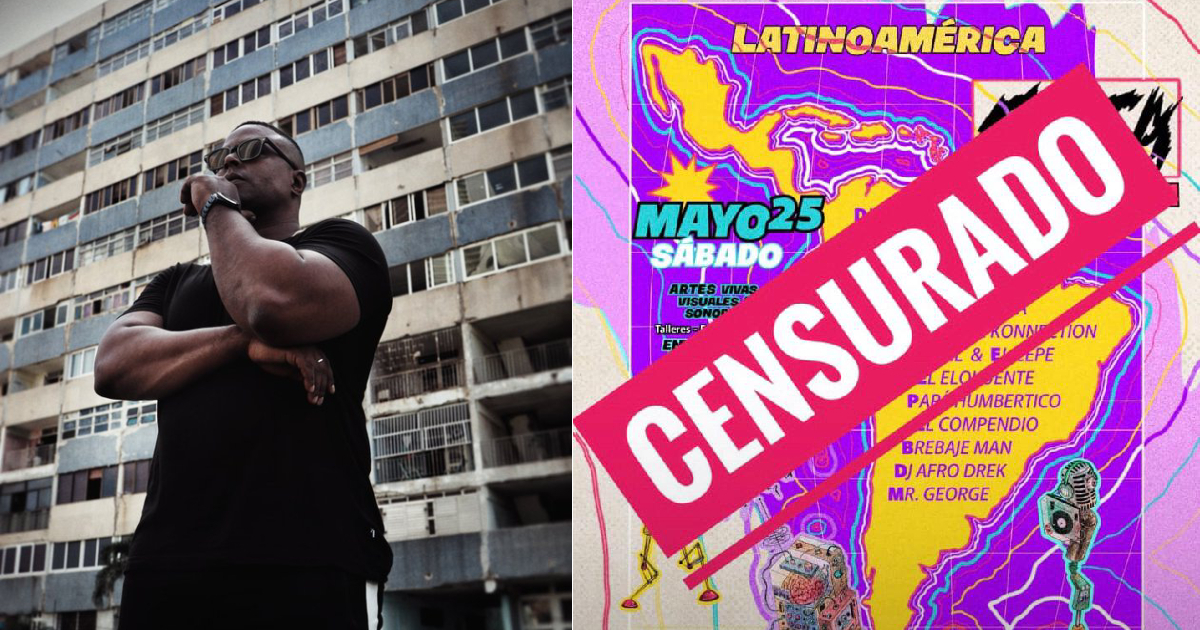Originally scheduled to span three days at the Fellini Bar in Havana, the Forma Tu Bulla rap festival fell silent on its final night as performances were "unilaterally" canceled. Under the slogan Latin America Shouts from Cuba, the event took place over its first two days (May 23 and 24) amidst complaints and grievances, reported the democratic coalition D'Frente, while denouncing the arbitrariness of the decision on the social media platform X.
A declaration issued on May 27—and signed by several organizations—stated that the suspension "prevented the participation of rappers from Compendio Soandry HDC and NavyPro, as well as Elokuente and other artists," underscoring once again how the Cuban regime censors artists. According to the letter, on May 25, a police patrol was stationed near the bar, located in the Playa municipality, and the decision was "orally communicated to the bar owner, who later informed the organizers that the Thursday and Friday events would proceed, but the Saturday concert was canceled unilaterally."
"In this way, the regime enforces Decree 349 of 2018, a Gag Law that restricts the freedom of expression and creation of Cuban artists through the figure of the supervisor-inspector—or directly by State Security agents—which was condemned by most of the Cuban cultural community after its approval," the declaration explains.
"With this measure, the regime once again shows its fear of its own people, especially the cultural sector for its ability to connect with ordinary citizens. Artists are first and foremost neighbors, members of a community, friends, family, and people who suffer the same hardships as their fellow citizens and, therefore, become symbols of change, trustworthy interlocutors, and close allies," the statement points out.
The event featured a diverse program of live, visual, and sound arts, including workshops, exhibitions, and showcases by DJ Dataset, Mike Style, Reymel, Other Place, Más Milo, Erick, Lino, among others, as well as artists YoLoopz, Roxi, Dinastía Urbana, Papagoza, Sekou, and many more.
Participants expressed their regret over the incident and apologized to the public via various digital platforms, including activist and musician Osvaldo Navarro Veloz, who also highlighted the value of Cuban rap in the current context, stating it "has the opportunity to regain its strength, to play a leading and important civic and social role."
Meanwhile, rapper, producer, and founder of the Real 70 studio, Papá Humbertico, remarked, "The obsolete mentality of those who 'lead' this country doesn't change! I apologize to everyone who planned to attend and stand in solidarity with the artists and organizers! See you soon!"
The D'Frente coalition called for the defense of the art world from the forces of censorship, asserting that the creative universe "should be, above all, a realm of spontaneity. It is a continuous assault on freedom, a persecution of politically uncomfortable content, and an attack on the citizens' right to know other realities different from the official Cuban institutional viewpoint."
Censorship in Cuba is not a new issue. In 2020, the Cuban Rap Agency, subordinate to the Cuban Institute of Music, labeled the dissident singer Denis Solís as a "supposed rapper" who does not represent the genre in the country. In an official statement, the entity questioned the solidarity shown by the San Isidro Movement towards Solís, who was sentenced to eight months in prison for alleged contempt.
Recently, Lisandra Rodríguez, known as the "Cuban Amy Winehouse" due to her striking resemblance to the late British singer, was expelled from the bar where she worked as a waitress in Old Havana, as revealed by the young woman on her social media.
In June 2023, Cuban filmmaker Juan Pin Vilar sent a letter to Cuban President Miguel Díaz-Canel regarding the regime's blatant censorship of the documentary La Habana de Fito. The missive recalled that in April of that year, the Ministry of Culture banned the screening of the material at the El Ciervo Encantado theater group venue in Vedado, as part of the censorship of a documentary projection series.
The filmmaker expressed his disagreement with the measure in the letter, calling it "a deplorable act that imposes a biased view on the documentary and subordinates Fito Páez's testimony to political or historical credibility questions."
Key Questions about Cuban Censorship and Artistic Freedom
Here are some frequently asked questions and answers that shed light on the ongoing issue of censorship in Cuba and its impact on artists and their freedom of expression.
What is Decree 349 of 2018?
Decree 349 is a regulation enacted in 2018 that restricts the freedom of expression and creation of Cuban artists. It allows the government to control artistic content through supervisors or State Security agents, leading to widespread condemnation from the Cuban cultural community.
How has Cuban censorship affected artists?
Cuban censorship has led to the unilateral cancellation of events, restriction of artistic expression, and persecution of artists who produce politically uncomfortable content. This has stifled the creative freedom of many artists in Cuba.
What actions are being taken against censorship in Cuba?
Various organizations and coalitions like D'Frente are calling for the defense of artistic freedom and the creative universe from censorship. Efforts include public declarations, digital activism, and solidarity movements to support affected artists.
Who are some notable figures affected by Cuban censorship?
Notable figures affected by Cuban censorship include rapper Denis Solís, filmmaker Juan Pin Vilar, and singer Lisandra Rodríguez, among others. These individuals have faced various forms of repression, from imprisonment to public denunciation and job loss.
